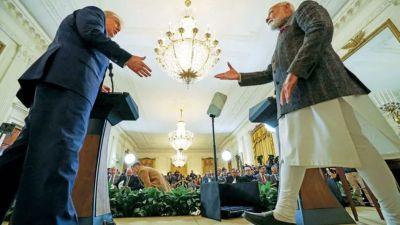PSU chiefs wake up to wide difference in salaries
Ever fattening pay packets of private sector CEOs have prompted the public sector executives to demand a better deal from the government. Th...

Ever fattening pay packets of private sector CEOs have prompted the public sector executives to demand a better deal from the government. Those at the forefront in airing the grievance of PSU executives were Indian Oil Corporation (IOC) Chairman Sarthak Behuria and National Textile Corporation (NTC) chief Ramachandran Pillai.
Both these PSU executives utilised the Standing Conference of Public Enterprises (Scope) workshop on ‘Emerging issues in pay and reward system’ to make a case for narrowing the widening gulf between the take home salary of a private sector CEO and his counterpart in public sector. Behuria is also the chairman of the Scope.
Pillai, in his key note address at the workshop on Thursday, regretted that chairman and CEOs of Indian public sector undertakings, ‘‘Could easily figure among the lowest paid CEOs in the industry in which they operate.’’
He illustrated his point by stating that SBI chairman gets less than Rs 5 lakhs per annum as against Rs 50 lakhs being drawn by HDFC chief. Similarly, he said, the chairman of Indian Oil Corporation (IOC) draws less than Rs 10 lakh compared with more than Rs 9 crore being taken home by Reliance Industries chairman Mukesh Ambani. ‘‘Many of the managerial staff of RIL earn more than Rs 50 lakh per annum,’’ he added.
Pillai further pointed out that CMD of the Rashtriya Chemicals and Fertilisers receives around Rs 7 lakh per year, while managing director of Indo-Gulf Fertiliser draws more than Rs 1 crore. Even Deepak Fertilisers CEO gets around Rs 60 lakh per annum, he added. While BHEL chairman gets around Rs 10 lakh per year, the ABB managing director draws around Rs 35 lakhs per annum, he said.
Behuria, in his inaugural address, emphasised that pay differentials in public and private corporates should be equitable. ‘‘They should be contingent on performance. This will provide incentive to executives to improve performance,’’ he added.
The Scope chief regretted that, ‘‘salary structures in private companies have risen so high as to create vulgar disparity between workers and senior managerial personnel.’’ In contrast, he added, the disparity has been shrinking in the public sector.
Behuria suggested that the PSUs should be innovative in designing new monetary and non-monetary rewards, which will optimise the satisfaction of employees without increasing costs to the firms.
Director general of Scope S.M. Dewan underlined the need for a paradigm shift in pay and reward system of the PSUs. He said a review of the compensation system in the PSUs has become inevitable.
Referring to the widening gulf between the salaries of the executives, Dewan pointed out that while SAIL chairman draws a salary of Rs 8.33 lakh per annum, Tata Steel chief gets Rs 1.23 crore.
Photos



- 01
- 02
- 03
- 04
- 05



























